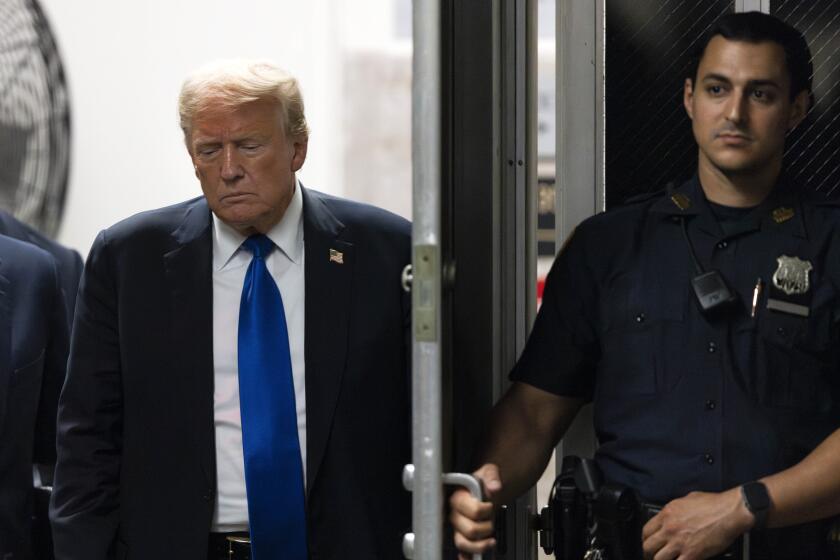Q&A: Yes, Trump could be elected president as a convicted felon

- Share via
WASHINGTON — Donald Trump became the first former president to be convicted of felony crimes. A New York jury on Wednesday found him guilty on all 34 counts in a financial scheme related to the 2016 election.
Jurors deliberated for 9½ hours over two days before convicting former President Trump of all 34 counts he faced in a hush-money scheme surrounding the 2016 election.
Here’s a look at the unprecedented legal questions Trump’s situation presents.
Could Trump become president after being convicted of a crime?
Yes.
There’s nothing in the Constitution or federal law that prevents a felon from holding the nation’s highest office.
While many federal employees would not be hired if they had a felony conviction on their record, the Constitution sets only a few bare-bones requirements for the chief executive.
“No Person except a natural born Citizen...shall be eligible to the Office of the President,” it says.
Get the L.A. Times Politics newsletter
Deeply reported insights into legislation, politics and policy from Sacramento, Washington and beyond. In your inbox three times per week.
You may occasionally receive promotional content from the Los Angeles Times.
While today’s voters worry about candidates who are too old, the men who wrote the 1787 document sought to screen out those who were too young or lived abroad. A president must have “attained the age of 35 years and been 14 years a resident within the United States.”
Elizabeth Wydra, president of the progressive Constitutional Accountability Center, says it is a mistake to assume the legal system will stand in Trump’s way.
“Nothing prevents him from running for president and being elected, even if he is in jail at the time of the election,” she said.
Incidentally, the law is not so generous to voters, she noted.
“Having a felony on your record can prevent you from voting for president in some states,” Wydra said.
How can the Constitution lack such a good-conduct clause?
Historians say the eminent figures who wrote the Constitution put their trust in electors to choose the president.
They did not foresee a disreputable character ever winning the allegiance of these electors, who were typically property-owning white men like them. Alexander Hamilton, who helped devise the electoral-college system, expressed confidence that it would bring forth “characters preeminent for ability and virtue” who would win the “esteem and confidence of the whole Union.”
Within a few decades, that system was gradually replaced by one in which the voters decide state-by-state on the slates of electors who are pledged to one candidate.
Doesn’t the 14th Amendment disqualify candidates who “engaged in insurrection?”
Yes, but Trump was not charged with insurrection after the Jan. 6 attack on the Capitol.
And the Supreme Court ruled unanimously in March that states acting on their own may not enforce this provision.
Congress would have to act in order for that provision to be enforced.
Has anyone ever run for president from prison?
Yes.
Eugene Debs ran five times as the Socialist Party candidate for president and won nearly a million votes in 1920 when he was serving a prison term for sedition.
Debs had spoken out against the World War I draft and earned the ire of President Wilson. But shortly after winning the White House, President Harding commuted the sentence.
What about the other criminal charges?
The two most serious cases involve the federal charges brought by special counsel Jack Smith. He indicted Trump in Washington for conspiring to subvert the counting of the electoral votes after Trump lost the November 2020 election.
In a separate case, Trump was charged with leaving the White House with highly classified documents, keeping them in his Florida home and refusing to return them when requested.
Both of those cases are moving slowly and are not expected to be tried and completed by the time of the November election.
What happens to the federal cases if Trump wins the election?
If Trump were elected president again, the chief executive could order the federal prosecutions be dropped.
He could also issue pardons for all of his aides and allies as well as the hundreds of his supporters who broke into the Capitol to stop the certification of President Biden’s victory.
What about the Georgia election interference case?
In a third criminal case, Fani Willis, the Fulton County, Ga., district attorney, brought a sprawling racketeering indictment against Trump and 18 others for allegedly conspiring to upset the vote count there.
That case has been sidetracked by allegations that Willis hired a romantic partner to run the prosecution.
Could Trump face jail now that he has been convicted in the hush money case?
Yes, but it’s unlikely.
New York lawyers say defendants with no criminal record who are found guilty of a nonviolent offense are usually given probation, not a jail term.
And even if Trump provoked an irritated judge to make an exception in his case, he could be released on bail while his lawyers appeal the conviction.
Could a reelected President Trump pardon himself in the New York hush money case?
No.
The president pardon power is very broad, but it applies only to federal offenses, not to crimes under state law. The same would be true of the Georgia case.
More to Read
Get the L.A. Times Politics newsletter
Deeply reported insights into legislation, politics and policy from Sacramento, Washington and beyond. In your inbox three times per week.
You may occasionally receive promotional content from the Los Angeles Times.












